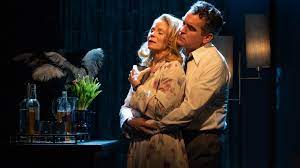The pleasures of attending an Off-Broadway production is seeing something different, maybe a little more weighty or quirkier than the fare uptown on Broadway. Dead Outlaw, is on the idiosyncratic side. It’s an off-beat musical, based on a true tale, that is a rollicking good time. Strange. Outlandish. Weird. Yes. But this tale of the Old West, which eventually spans over 60 years, is nothing short of entertaining.
The creative force behind Dead Outlaw reunites the team from the multi-Tony Award winning musical The Band’s Visit. The score is by David Yazbek (this time with Erik Della Penna). The book is by Itamar Moses and direction is from David Cromer. Dead Outlaw, though, is as far removed from the meditative, gently-paced The Band’s Visit as one could imagine.
The show is essentially divided into two parts. The first half of the 100-minute, intermission-less production, focuses on Elmer McCurdy, a man searching for a purpose, who rides the rails seeking a place in society. He’s also a drunken brawler that tries to settle down, joins the Army and, finally, turns to crime. He is not the best of criminals and ends up dead from a bullet at the age of 30. From there, and this is the second part of the show, his embalmed corpse (with a tad of arsenic to hold back the decaying process) becomes mummified over a short period of time. Throughout the ensuing decades his body, peacefully lying in an upright coffin, is paraded at side shows, a cross-country race, and even stars in the movies. The cadaver is eventually left in a storage closet until rediscovered and shuttled off as a prop, now painted a day-glow red, for a horror-themed amusement ride. When an episode of The Six Million Dollar Man is about to be filmed there, the display is revealed to be a human corpse. Shrieks! In the end, the body of Elmer McCurdy, a man who lived, and died, a strange life is buried with great fanfare.
The cast, all but Andrew Durand as the star-crossed bandit Elmur McCurdy, play multiple roles. Durand, who last season appeared in the musical-comedy Shucked, is all-together different in Dead Outlaw, playing a pugnacious, rapscallion bandit. His full-throttled performance, before his ignoble demise, on the small Minetta Lane stage, energizes the production. He also deserves some type of award for staying so motionless for such a long time in the plain-box, upright coffin.
Jeb Brown, who serves as the narrator from the center of Arnulfo Maldonado’s simple, wooden front porch set, is also the front man for the six-piece on-stage band, led by Rebekah Bruce’s superb musical direction. The actor is terrific, whether chronicling the show’s historical events, stepping into character as a dumb luck train robber, or strumming his guitar. The rest of the cast – Eddie Cooper, Julia Knitel, Ken Marks, and Dashiell Eaves – are outstanding, providing engaging, mostly humorous portrayals. While all the performers are first-rate, two deserve additional mention for their musical solos. Trent Saunders, gives a spirited, exhausting telling of a Native American runner. Thom Sesma is outlandish as a coroner crooning a Vegas-styled lounge number.
The score, by David Yazbek and Erik Della Penna, which is sung primarily by the band, contains a combination of powerful rock-heavy tunes balanced with a few slower introspective songs. All together, they energize the musical and allow a few of the performers, most notably Andrew Durand, the opportunity to conjure up his inner punk rocker. Occasionally, the sound design by Kai Harada and Joshua Millican allows the instrumentation to slightly overwhelm the singers, but the gist of the songs do come through.
Director David Cromer, working with Itamar Moses’ inspired, lively, vignette-laden libretto, winningly guides the story at a fast-paced clip. He flawlessly integrates the aforementioned stage band with the action on stage. The transitions are smooth, quick and seamless. He incorporates Heather Gilbert’s lighting designs at just the opportune moments to intensify a scene.
Dead Outlaw, an exuberant, lighthearted romp, playing at the Minetta Lane Theatre through April 14.
















